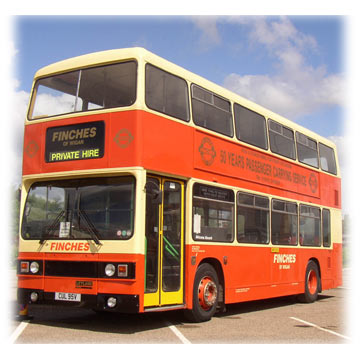The World's Our Bus Stop
My November 2005 circumnavigation of Greater Manchester by bus (Page 3)
Contents:
Bus types:
Double decker, step entrance: 3 (5)
Double decker, low floor: 2 (0)
Single decker, step entrance: 3 (2)
Single decker, low floor: 4 (2)
Midibus: 0 (2)
Temporary traffic lights: 4 (0)
Price per journey (estimates):
System One bus and rail Countycard (£70.70): 20p
System One bus only day saver (£3.50, peak periods): 29p
Single fares (approximate average): £2.20
Conclusion
Since my first circumnavigation was recorded, the last six to seven years has seen:
- Little change in market share;
- A loss in express and limited stop bus routes;
- Small improvements in timekeeping;
- A welcome trend towards low floor single and double deckers;
- 'Two tier networks': less glamorous routes with inferior rolling stock.
Market Share:
On the strength of the two circumnavigations, the market share of the two former GM Buses companies has remained static. Outside of these findings, Stagecoach Manchester has seen passenger numbers grow from 71 million in 1996 to 80 million in 2005. This has been further buoyed by the acquisitions of Glossopdale in 1998, Universal Buses in 2000, and R. Cooper (trading as Dennis's Coaches) in April 2005.
First Manchester, too has acquired a fair number of companies since 1999. This began with First Pennine (from sister FirstGroup subsidiary, First PMT) and Timeline in 2000. The second independent to be acquired was Houston Ramm's company, The Coachmasters the following year. Based in Ince Bar, this formed the basis of the schools unit.
Arriva North West has seen some increase in market share with the acquisition of Blue Bus, which was set up by former Shearings (the Wigan coach company also had interests in Timeline) employees.
The biggest impact in maintaining market share since 1999 have been made on cheap single company only season tickets, which can be bought on the bus. The first manifestation of this came in 1996, when Stagecoach Manchester halved the price of its Network 7 ticket from £10.00 to £5.00. Rebranded the Manchester Mega Rider in 1997, the result has been a significant drop in single fare sales for regular passengers, who choose to purchase the cheaper weekly tickets.
Express Routes:
Since 1999, there has been a marked drop in the number of limited stop bus routes in the Greater Manchester area. High profile casualties have included the 400 Trans-Lancs Express (which saw its Manchester Airport connection and Sunday service withdrawn in May 1999) and the 153, Mossley to Manchester express. In some cases, market share may have been lost to the railways, with direct trains to Manchester Airport. For example, it is now more convenient for Bolton passengers to go by rail to Ringway than it was to get the 400 or 500 services.
Low-floor Vehicles:
In 1999, the low floor bus in the current form was considered a novelty in most parts of Greater Manchester. Some low floor buses even had step entrances. From 1994, the 408, Shaw to Stalybridge route had double deckers with a retractable step entrance, where retractable longitudinal seats were housed on the lower deck. Today, most main routes are served by low floor vehicles, from the Optare minibuses on the 419, Middleton to Ashton-under-Lyne service, to double deckers on the Wilmslow Road corridor.
Two tier networks:
Despite the increased presence of low floor vehicles, another emerging factor has been a two tier system of routes. For example, a more direct route A would have the latest low floor Wright bodied Dennis Darts, whereas a parallel, though less direct route B would be saddled with ageing Leyland Olympians. Due to profitability and maintenance issues, less attractive routes often sport inferior rolling stock.
Between 1974 - 86, Greater Manchester Transport prided itself on a high degree of standardisation, lowering maintenance costs, and enabling a uniform pattern of standards in service delivery.
Outside of London, where services are regulated and subsidised, the network is less consistent, with the resultant switch to the car or local train services. Due to the more free trade orientated nature of bus operations outside the M25, networks shift more constantly, through acquisitions, short lifespans of new services and withdrawals of existing services, due to a dearth of subsidy.
As with London, there is a case for franchising existing services. These should include commercial services as well as subsidised routes. Emphasis should also be given to cross-boundary services, journeys serving local hospitals, Sunday and Bank Holiday provision, and limited stop routes. Companies should be required to run each service, or block of services for a set franchise period (for example, five years), subject to standards set by local authorities or passenger transport executives. Further obligations should be created for journeys linking with rail, underground or light rail stations.
Much talk of franchising has been made by the passenger transport executives for the last five years. A constantly shifting network undermines passenger confidence. Service changes at short notice also plays havoc with work-life balance, travelling to work, and leisure activities. Thankfully, this has been addressed in Greater Manchester, with the big three companies, FirstGroup, Stagecoach and Arriva stating their service changes at a set date, four times a year. However, this needs to remedied with smaller operators and tendered services.
Stuart Vallantine,
Sunday, 22nd January 2006.
